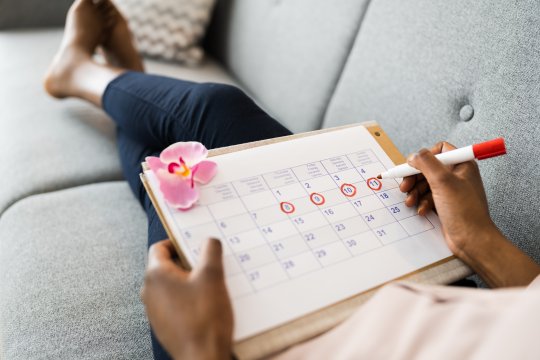No stress, no secrets. How to prepare a young woman for her first period?

Adolescence is a tough time that brings about an upheaval not only in your body but also in your mind. A young person at the brink of adolescence easily gets emotional and is extremely sensitive and self-conscious. Changes to the body, concerns about the skin and, eventually, getting the first period are all like an earthquake that can ruin the already uncertain and unstable reality in the life of a growing teenager. After all, we should understand that perfectly; we have all been through this ourselves. Lucky are those who stepped into adulthood with ease, confidence and self-awareness and with the love and care of supportive parents.
Unfortunately, not everyone can boast of such a great experience. For many, adolescence was incomprehensible, stressful and shameful, and periods were treated like an embarrassing disease that is best to be gone through in total isolation. These bitter experiences were made even worse by negative social attitudes. Blood-stained trousers, pad shortages, stomach-aches during class—we can clearly remember the guilt and shame we felt, with teachers and peers mocking instead of supporting. One would like to believe that those days are gone and today puberty and monthly periods are natural and understandable for everyone; yet, the opposite is the reality. A menstruation report prepared by Difference, a research company, for the Kulczyk Foundation, clearly shows that monthly periods continue to be social taboo and remain a cause of shame and isolation for many interviewees. The only way to change that is to educate, and education should start early in childhood. Casual and natural talks with one’s child about menstruation will help them to enter puberty with greater love and respect for their body and with greater empathy for those around them. Here are some easy steps to make your kid get used to the idea of periods.
‘The adolescence: the most delicate transition.’ (Victor Hugo, writer)
Talk to your kid
But you do not want to wait until zero hour to do that, or only when menstrual bleeding first occurs, but much earlier. Take advantage of natural situations, such as when you are buying pads at a store together or your kid happens to see menstrual blood on underwear. Encourage them to ask questions, inspire curiosity and teach them that monthly periods are a natural physiological process in women that should not cause shame or embarrassment.
Many parents are concerned that broaching the subject of menstruation early in childhood does not make much sense because the little one will not understand anything anyway. That is nonsense. You can talk and you should! At any age and under any conditions there is always a way to explain to your offspring in simple words what that puberty is all about. The sooner your kid is provided with the essential knowledge, the more at peace they will be the moment they enter puberty. Kids who are made familiar with menstruation from early age are not likely to see it as something to joke about or be ashamed of or embarrassed about later in life. Thus, it is important to talk monthly periods with boys too. Knowing what puberty looks like in girls, they may show understanding to them and in time they will provide invaluable support to their female partners.
Share your story
When going through puberty, a girl should be aware that menstruation is not a punishment for sins but a natural thing that every woman experiences. Alas, many girls see their monthly bleeding as an unfair injustice at first. To ease the feeling of alienation, you may wish to tell your teen girl your own first period story. Today, the public conversation about the subject is growing ever louder, but back in 1980s and 1990s menstruation was absolute taboo women only whispered about. What was going through puberty like back then? What memories in particular stick out to you? What emotions surrounded bleeding? By sharing all this with your growing daughter, you will show her both that she is not alone with it and that she has your full support and understanding.
Menstruation is not just girly stuff. Include the father and son in the conversation.
Although puberty, sex and physiology are now openly discussed, the subject of menstruation is awkward for many men and they tend to see it as feminine stuff that they don’t want to touch. This is a misguided attitude that only reinforces the feeling of alienation and being misunderstood in women and deprives ladies of support from their male partners. To break the cycle of ignorance, you may want to engage males in the conversation. If you talk periods with your daughter, do not hide from others in the house in a separate room. Such discussion should be open, honest and accessible for everyone. If your growing girl has a brother, let him have a chance to understand female physiology too. Fathers should also provide support to their teenage girls so that they do not shy away from asking to buy them sanitary pads or writing a letter of excuse from school due to feeling unwell. By approaching menstruation in a totally casual and natural way, you will show your kids that this is a normal course of things and an integral part of being a woman, and in time they will pass that knowledge on.
Agnieszka Małgorzata Adamska
More about the programme: http://takdlapodpasek.pl
The text was published on https://takdlapodpasek.wp.pl/

